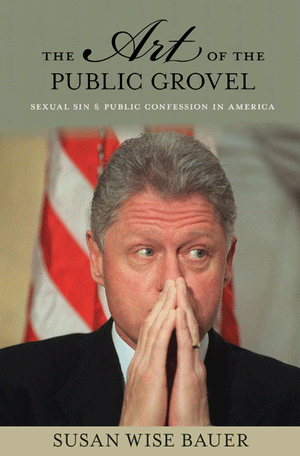
The Art of the Public Grovel: Sexual Sin and Public Confession in America
by Susan Wise Bauer
Ninth Circuit Judge Alex Kozinski might want to pick up a copy of Susan Wise Bauer’s The Art of the Public Grovel.
The beleaguered jurist, pilloried for keeping a less-than-private folder of naughty pictures and videos, is again the subject of media attention, this time for forwarding a few crass jokes to willing members of an “Easy Rider Gag List.” (An appropriately-named list if there ever was one.)
Kozinski went so far as to encourage an investigation into his own conduct, but he didn’t manage what Bauer classifies as the key element in the formula for a successful confession: admitting moral guilt. Forget the actual nature of the crime (and Bauer rarely dwells on, say, the vast distinction between Jimmy Carter giving the sugar eye to a rare woman and Cardinal Bernard Law averting his eye from the abuse of boys). It’s all about spilling your guts.
The proper confession should also satisfy, Bauer argues, the cravings of a nation nurtured by evangelicalism, democracy, group therapy and television talk shows. It should set the crime and the confession in the context of a personal struggle between good and evil (as Augustine did centuries ago). It should promise, if not a relinquishing of power, an appropriate limit to it. And ideally, it shouldn’t be printed in Playboy.
Barring some interesting asides on religious history – like the shift from “only drunks and madmen” admitting guilt to a wide embrace of the “non-rational” act of confession – and too-fleeting psychological tidbits on Americans and power, Bauer sticks to profiling a few public confessions to see who hewed closely to the formula and how they fared. She minutely parses the language of whatever admissions were made and the corresponding peaks and valleys of public opinion, and includes all the confessions in a series of appendices (fascinating reading alone).
The biggest loser seems to be televangelist Jim Bakker, who blamed various conspirators, rather than his moral failings, for his shacking up with a young church secretary in a hotel. Sen. Ted Kennedy didn’t fare too well either. He hung on to his gig for decades but missed the White House, Bauer argues, because he merely pleaded guilty to a misdemeanor, and not a higher moral charge, for leaving the scene after driving his car and his passenger, a picture of “total, blond innocence,” off a bridge. (Bauer also includes a gory political cartoon of the soaked, skeletal delegate from Chappaquiddick.)
But the granddaddy of all confessors, by Bauer’s count, is Bill Clinton, whose various professions and evasions preoccupied the public for his final years in office. Despite his acrobatic manipulation of words, and the attendant public ridicule, Clinton survived with soaring approval ratings because of his moral confession and his silver-tongued but not silver-spooned Southern Baptist roots.
Bauer’s book could not fully discuss the slew of scandalous public personalities outed recently – New Jersey Gov. James McGreevey, candidate John Edwards, Rep. Mark Foley, Rep. David Vitter, televangelist Ted Haggard, New York Gov. Eliot Spitzer, or even loofah-happy TV host Bill O’Reilly. (Not to mention the non-sexually corrupt kind of man, like the recently charged Illinois Gov. Rod Blagojevich, who wouldn’t be helped by this book.) But clearly, she’s on to a trend: Americans’ rubbernecking fascination with the sex scandal, and the way we’ve managed, much to the surprise of Frenchmen everywhere, to allow and accept sexual promiscuity in our peculiar American way: by letting it slide as long as it’s properly confessed and nominally condemned.




Send A Letter To the Editors